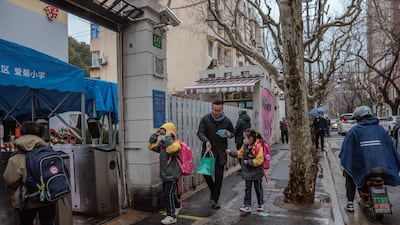The Covid-19 pandemic has delayed children's learning and slashed the future earnings of young people in low- and middle-income countries, increasing the risk of a "lost generation", according to the World Bank.
Millions of today's students could lose up to 10 per cent of their future income due to pandemic-induced disruptions in their education, while toddlers could suffer a 25 per cent decline in earnings when they become adults.
The findings are based on the Washington lender's analysis of global data on young people who were under the age of 25 at the onset of the pandemic. The new report analyses global data on the pandemic’s effect on young people at key developmental stages: early childhood (0-5 years), school age (6-14 years) and youth (15-24 years).
"The pandemic and school closures threatened to wipe out decades of progress in building human capital. Targeted policies to reverse the losses in foundational learning, health and skills are critical to avoid jeopardising the development of multiple generations," said David Malpass, president of the World Bank Group.
“Countries need to chart a new course for greater human capital investments to help citizens become more resilient to the overlapping threats of health shocks, conflict, slow growth and climate change and also lay a solid foundation for faster, more inclusive growth."
The pandemic forced governments to take measures to restrict the virus, including closing schools and offices, before starting online classes and remote working. The global health crisis also disrupted other key services such as maternal and child health care and job training.
A new study by global consultancy PwC urged governments to collect and process more comprehensive data on child and adolescent mental health care and wellbeing after the pandemic, by using new technologies and data analytics.
Policymakers must invest in the wellbeing of their citizens earlier on to "give them the best possible chance in life", said Hamish Clark, Middle East health industries partner and Middle East chief wellness officer at PwC.
Pre-school-age children in several countries have lost more than 34 per cent of learning in early language and literacy and more than 29 per cent of learning in maths due to the pandemic, compared with pre-Covid cohorts, the World Bank said.
In many countries, even after schools had reopened, pre-school enrolment had not recovered by the end of 2021 and was down by more than 10 percentage points, the report said.
Among school-age children, on average, for every 30 days of school closures, students lost about 32 days of learning.
In low and middle-income countries, nearly a billion children missed out on at least a full year of in-person schooling as a result of school closures, and more than 700 million missed one and a half years. As a result, learning poverty — already at 57 per cent before the pandemic — has increased further in these countries, with an estimated 70 per cent of 10-year-olds unable to understand a basic written text, the report said.
The pandemic also dealt a heavy blow to youth employment. Forty million people who would have had a job in the absence of the pandemic, were jobless at the end of 2021, worsening youth unemployment trends, the report said.
The income of young working people shrunk by 15 per cent in 2020 and 12 per cent in 2021.
People entering the labour market with lower education will earn 13 per cent less during their first decade in the job market.
Evidence from Brazil, Ethiopia, Mexico, Pakistan, South Africa and Vietnam showed that 25 per cent of all young people were not in education, employment or training in 2021.
Invest in youth or risk 'multiple lost generations'
The window to address these setbacks in human capital is small and urgent action is necessary, the World Bank said.
Without a quick response by policymakers to recover from current losses and forestall future ones, the pandemic threatens to further deepen poverty and inequality, the lender warned.
“People under the age of 25 today — that is, those most affected by the erosion of human capital — will make up more than 90 per cent of the prime-age workforce in 2050,” said Norbert Schady, chief economist for human development at the World Bank and a lead author of the report.
“Reversing the pandemic’s impact on them and investing in their future should be a top priority for governments. Otherwise, these cohorts will represent not just a lost generation but rather multiple lost generations.”
Short-term measures to help young children include supporting targeted campaigns for vaccinations and nutritional supplements; increasing access to pre-primary education; and expanding coverage of cash transfers for vulnerable families.
For school-age children, governments need to keep schools open and increase instructional time; assess learning and match instruction to students’ learning levels; and streamline the curriculum to focus on foundational learning, the World Bank said.
For youth, it recommended support for job training, entrepreneurship programmes and new workforce-oriented initiatives.
In the longer term, countries need to build "agile, resilient, and adaptive health, education and social protection systems that can better prepare for and respond to current and future shocks", the World Bank said.












